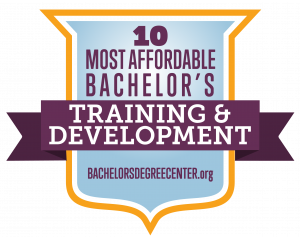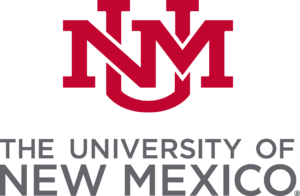
These days, there’s a plethora of ways to save money on a degree or professional training program. Some of those ways are practical and day-to-day. However, starting with affordable training and development degree programs to begin with goes a long way toward ensuring a student can save money while also receiving a quality education.
One major way to cut costs is to find affordable training and development degree programs online. An online degree program is typically more affordable under many circumstances. This isn’t always the case, but odds are it’s easier for an applicant to find a less costly online program than one that takes place in a more traditional setting.
Related:
- Best Bachelor’s in Training and Development
- Best Online Bachelor’s in Training and Development
Methodology: Ranking the Most Affordable Training and Development Degree Programs
The Bachelor’s Degree Center ranking of the most affordable training and development degree programs online features accredited, legitimate colleges and universities. Programs are presented in order of tuition cost, using current IPEDS data.
1. Louisiana State University

Louisiana State University offers a BS in Learning Experience Design and Innovation (LXDI), which is among the most affordable training and development degree programs in Louisiana and the southern US. This 120 credit bachelor’s program can be completed entirely online and include these cutting edge classes ‑Elearning Experience Design, principles of human resource, adult learning, worker stress, and health and applied leadership, to name a few. Potential careers for graduates include learning specialists, instructional designers, and educational administrators, among others.
Louisiana State University (LSU) was established in 1853 as a seminary of learning for the state. The university’s Baton Rouge campus along the Mississippi River and online platform serve more than 23,150 students each year.
What We Like: Louisiana State University operates as the state’s flagship campus and space, sea, and land-grant higher learning institution.
Degree: BS in Learning Experience Design and Innovation
2. University of North Carolina at Greensboro

The University of North Carolina at Greensboro offers a BS in Human Development & Family Studies that can be finished 100% online – mostly asynchronously. Applicants to UNC’s affordable training and development degree programs must hold an Associate of Applied Science degree from an accredited North Carolina community college. US News and World Report rank UNC’s human development program among the best in the nation. Sample classes include families and close relationships, issues in parenting, and family diversity, among others.
The University of North Carolina at Greensboro was chartered as a teacher’s training and industrial school in the early 1890s. UNC’s Greensboro’s urban campus and online platform is home to more than 19,550 undergraduate and postgraduate students.
What We Like: UNCG is organized into ten colleges/schools offering programs in nursing, health, performing arts, business, nanoscience, education, and art/sciences, among others.
Degree: BS in Human Development and Family Studies
University of North Carolina at Greensboro
3. Granite State College

Granite State College offers a BS in Applied Studies in Education and Training that has been designed for students who already hold an associated degree in an applied field. Students graduating from GSC’s affordable training and development degree programs find rewarding careers as a facility educator, a senior training specialist, or a training & development consultant. Featured classes include the learning workplace, and teaching & learning in adulthood, to name a few.
Granite State College is a member school of New Hampshire’s university system that was founded in the early 1970s. Washington Monthly has ranked Granite State College among the top school in New England. The college maintains a second facility in Manchester.
What We Like: Granite State College primarily offers coursework and programs designed to serve adult learners.
Degree: BS in Applied Studies – Education and Training
4. University of Central Florida

The University of Central Florida offers a BS in Career and Technical Education that is among the leading affordable training and development degree programs in the Sunshine State. This 120-credit unit undergraduate degree from UCF prepares students for rewarding careers as a learning development specialist, corporate trainers, or professional development trainer, to name a few. Students explore the fundamentals of curriculum creation, career education, and more.
The University of Central Florida is a research institution of higher education that was chartered in the early 1960s as Florida Tech UCF’s main campus is a dozen miles from Orlando and a half-hour from Cape Canaveral. More than 71 850 undergraduate and postgraduate students each year.
What We Like: The University of Central Florida maintains several regional campuses in Lake Nona, downtown Orland
Degree: BS in Career and Technical Education
University of Central Florida
5. Indiana State University

Indiana State University offers a BS in Human Resource Development for Higher Education & Industry (BSHRD) that ranks among Indiana’s leading affordable training and development degree programs. Applicants to Indiana State University’s human resource development program must hold an associate degree in a related discipline to be eligible for admission. Featured classes for this undergraduate degree include work-life integration, developing occupational and training programs, adult learners in higher ed, and industrial-organizational psychology, among others.
Indiana State University is a public space-grant school that was founded as a normal school in the mid-1860s. The university’s Terre Haute campus and distance-learning platform serve more than 12,050 students each year.
What We Like: Indiana State University is organized into six colleges/schools in professional education studies, technology, business, health, and technology, among others.
Degree: BS in Human resource development for higher education and industry
6. Western Governors University

Western Governors University offers a BS in Human Resource Management that is ranked among the most affordable training and development degree programs by Best Value Schools for eight years straight. This fully online SHRM-aligned human resource degree is typically completed in about 3.5 years. Coursework for Western Governors University’s online human resource degree includes cases in advanced human resource management, employment law, training and development, technology applications in healthcare, and change management, to name a few.
Western Governors University operates as a nonprofit higher learning institution offering exclusive online programming. The university was born of the idea developed by 19 governors in 1997. The school’s student enrollment nears 120,000.
What We Like: Western Governors University is organized into four colleges/schools offering classes and diplomas in business, teaching, information technology, and health.
Degree: BS Human Resource Management
Western Governors University
7. Appalachian State University

Appalachian State University offers a BS in Workforce Leadership and Development that can be completed by full-time or part-time students – entirely online. Appalachian State University undergraduate program in Workforce Leadership and Development is recognized to be among North Carolina’s most affordable training and development degree programs. Degree candidates must complete 120-semester units to meet Appalachian State University’s graduate criteria. Potential careers for graduates of this degree include corporate trainer, career counselor, or workforce educator, among others.
Appalachian State University (App State) is a public institution of higher education that was founded in 1899. ASU’s college-town campus is home to more than 20,350 undergraduate and postgraduate students. Appalachian State offers more than 120 academic degree programs at the undergraduate graduate level.
What We Like: Appalachian State University is a member school of North Carolina’s university system.
Degree: BS in Workforce Leadership and Development
8. Pittsburg State University

Pittsburg State University offers a BS in Workforce Development that is designed for students who already have earned an Associate of Science or Arts degree. Pittsburg State University’s affordable training and development degree programs can be completed entirely online. Potential careers for Pittsburgh State University’s graduates include human resources manager, program coordinator, director of employee engagement, or training & development specialists, to name a few. This PSU program offers these academic concentrations – supervision and leadership, hospitality management, and human resources.
Pittsburg State University is a public space-grant school that was founded in 1903 as an auxiliary training school for teachers. The school’s rural campus and online platform serve more than 5,900 students each year.
What We Like: PSU also maintains a campus in Kansas City and offers degree programs in conjunction with the Salina Area Technical College.
Degree: BS in Workforce Development
9. University of Maryland Global Campus

The University of Maryland Global Campus offers a BS in Human Resource Management that requires degree candidates to complete at least 120 credits, with up to 90 credits available for transfer toward program requirements, if eligible. Featured classes for UM’s affordable training and development degree programs include labor relations, employee training and development, finance for nonfinance majors, organizational culture and change, human resource management, and employment law for business, to name a few.
The University of Maryland Global Campus was developed as UM’s University College in the late 1940s. The school serves more than 90,000 students across the globe, making it one of the largest distance-learning schools in the world.
What We Like: The University of Maryland Global Campus offers more than 100 academic programs at the undergraduate and graduate levels.
Degree: BS Human Resource Management
University of Maryland Global Campus
10. University of New Mexico

The University of New Mexico offers a BS in Instructional Technology & Training that is considered among the leading affordable training and development degree programs in New Mexico and beyond. This undergraduate degree in training and development requires students to complete a minimum of 121 credit units, with 45 credits pulled from the raining and development curriculum. Sample coursework includes online learning and strategies for success, creativity, and technical design, and leading the training organization, among others.
The University of New Mexico (UMN) is recognized as the flagship campus of the state. It was founded in the late 1880s. This space-grant school’s urban man campus in Albuquerque and satellite campuses in Taos, Los Lunas, Gallup, Rio Rancho, and Los Alamos) serve more than 25,250 students each year.
What We Like: The University of New Mexico holds the distinction of having one of the largest populations of Hispanic and Native American students and faculty in the nation.
Degree: BS in Instructional Technology & Training
How Do I Save Money on a Bachelor’s in Training and Development?
Affordable training and development degree programs only represent one aspect of the process that someone must go through to earn their education. Often, it’s the smaller costs that can add up and balloon the overall cost of earning a degree.
For example, a student will still need somewhere to sleep, food to eat, and possibly daily transportation. Everyone will have different needs depending on their specific situation, but no matter what, those small costs can become a problem.
In addition, an online program can also help to cut some of those smaller costs. For example, students of online programs usually don’t need to commute or pay to move and stay somewhere on or closer to campus.
Online degree programs also help a great deal for adults who work, take care of children, or otherwise have a life to live that they can’t abruptly stop to attend a regular class each day. Still, affordable training and development degree programs exist both on and offline. So, applicants can still plan based on their own goals and circumstances.
If the program has vetting and proper accreditation, it doesn’t matter what path an applicant chooses to earn their degree. The degree will still have the same weight and respect if it comes from a reputable and accredited program.
The question of affordability comes up often when considering higher education. Applicants should look at what they can do to mitigate those costs in every way possible. An affordable training and development degree program is only one place to start.
Applicants should look into grants, loans, scholarships, and any local, state, or federal programs that will help with any number of finances or services. There’s a lot of help available, but it’s typically on the applicant to do the legwork to find those things that might help them to help themselves earn their education.
How Much Can I Make with a Bachelor’s in Training and Development?
The amount a training and development specialist can earn will vary based on the typical factors such as education, experience, location, and all the other incidentals that control job markets. However, it’s possible to earn a good salary in this field, even entry-level training and development salary can look good, depending on the job seeker’s goals.
With only a bachelor’s degree, the Bureau of Labor Statistics reports that the median pay for training and development specialists sits at $62.7k across the nation. However, that median number changes depending on the industry the specialist works in.
For example, those who work in science and tech have a median salary of $73.69k. It’s also important to keep in mind that salary can change widely based on the employer and the title of the job.
Not all training and development jobs fall under the title of training and development specialist. The same education can sometimes lead to management roles or other titles that come with higher salaries attached.
Experience also matters. An entry-level training and development salary can grow a great deal for someone with some experience in the field they’re now trying to work in at a higher capacity.
Will a Certification Help My Career?
There are various types of certifications for training and development. However, certifications in training and development aren’t always necessary, nor are they always easy to obtain.
Nevertheless, there are several professional training and development certification paths someone can take. Some programs even offer certifications for training and development with graduation.
In almost all cases, certifications in training and development will help. Certifications show the professional takes their career seriously and has the willingness to do the extra required to prove it. Some employers may require specific or niche certification to prove the applicant knows that industry or business well enough to perform training and development duties within it.
Some of the more common training and development certification testing and programs come from SHRM and ATD. However, these aren’t absolutely necessary.
Applicants should ask around where they want to work what type of certifications the local businesses expect from their training and development specialists, managers, and HR personnel.
